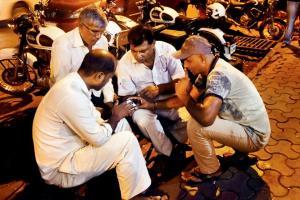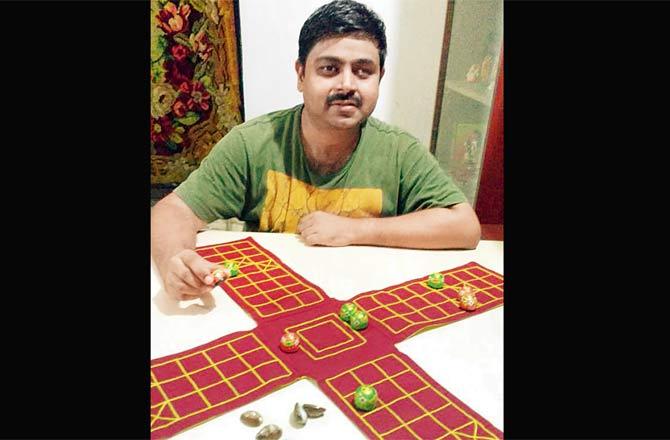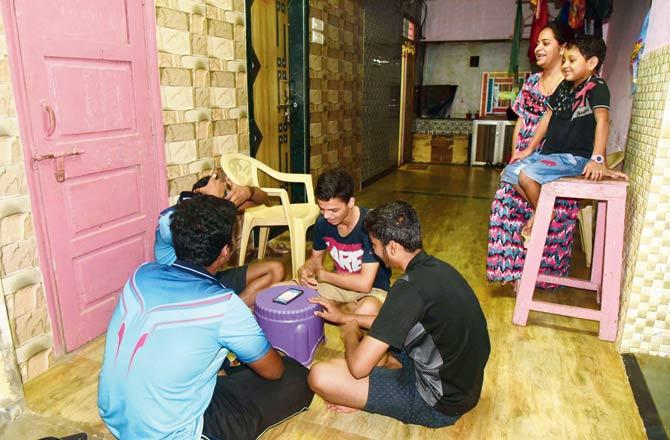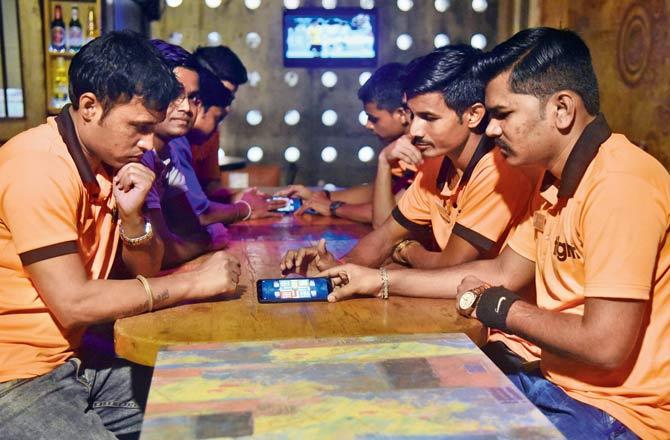A board game from our past has become an obsession with adult men, on trains, at tea stalls and in chawls. Welcome to the heady rush called Ludo King

Bhagwan Patel and (right) Chimman Patidar play the game at a Kala Nagar tea stall. Pic/Pradeep Dhivar
It's a warm October evening, and Chimman Patidar's tea stall at Bandra's Kala Nagar has a gaggle of taxi drivers huddled on a bench, poring over a phone. Their sporadic laughter is drowned by the traffic on the main road. For those standing around, sipping tea, this is a regular spectacle — one they've been witnessing for the last eight months, and something they pass off as flippant. The group couldn't care less about the derision.
ADVERTISEMENT
Admittedly, it's their downtime. Every day at 7.30 pm, the men gather for an hour or two at the makeshift thela for a game of Ludo King. When things heat up, it could continue for upto three hours. "It rejuvenates me, and prepares me to go back to the grind," says Bhagwan Patel, a 59-year-old taxi driver from Bihar. His four-year-old Chinese-make smartphone had never seen an app-based game until now. The only purpose the handset served was to help him reach his family back home. "Occasionally, I'd listen to music while waiting for customers at Bandra Terminus," he adds. It was last year during a routine round of chai that Patidar introduced Patel and a group of taxi drivers to the game. "Life wasn't the same after that," laughs Patel. "After years, I was experiencing child-like excitement."

Players in a Virar fast local on a weekday evening
Return to innocence
As per legend, the origin of Ludo goes back to the 16th century with Pachisi, a sport played in the court of Mughal emperor Akbar. French author ML Rousselet in his book, India and its Native Princes, writes, "The game of Pachisi was played by Akbar in a truly regal manner. The Court itself, divided into red and white squares, being the board, and an enormous stone raised on four feet, representing the central point." Each player's objective was to move all four of their pieces completely around the board, counter-clockwise, before their opponents do.
Raamesh Gowri Raghavan, an ancient Indian games researcher and professor of archaeology at Mumbai University, says, according to folklore, the world's largest game of Ludo or Pachisi and Chaupar, as it was referred then, was played at Fatehpur Sikri. "Its origins are shrouded in mystery, but legend has it that slave girls, dressed in the four colours, would move as pawns. Closer home, in Maharashtra, there's evidence of the game played in the Ellora Caves where the blocks were carved on the floor," he says.

Raamesh Raghavan, ancient Indian games researcher
The version we are familiar with today is one that was popularised by the British. "Earlier, they played on cloth. It was the officials of the East India Company who created the ornamental board and replaced cowri shells with Roman dice somewhere between 1875 and 1877. It was a simplified version," he says. The traditional board game requires participants to sit together around the multicoloured mat. Each player rolls the die; the highest roller starts the game. This has now been replicated onto an app titled Ludo King. All you need is a single handset. The design of the game closely feeds off the original game board, and is therefore instantly familiar. The objective is fairly straightforward; each player gets four tokens, these must make a full turn of the board before they make it to the finish line. "For an illiterate person like me, the appeal lay in the simplicity and the fact that it's free and requires no Internet connection. Zyada magajmari nahin hai," says Patel, who has taught the game to taxi driver friends at Bandra Terminus.
With 55 million downloads across the world and a staggering 10 million active users, Ludo King has managed to give Temple Run, Candy Crush and Pokemon Go, competition to become the number one free game on both Google Play Store, and App Store. Its user stickiness is something even founder Vikash Jaiswal, who launched the game in 2017, didn't expect. "We were hoping that Ludo King would reach the Top 10, but we didn't think it would make it to No.1 and sustain," he says. Jaiswal tapped into his own personal connection with Ludo to build the game.

Ludo-loving boys from Pachganga Building use the corridor. Pic/Suresh Karkera
"It was a game I enjoyed playing as a kid. I remember fighting with my friends over who will play which colour and I wanted to bring that simple joy back into people's lives. It also helped that when I was looking to create an app, there were no good Ludo games on the Play Store," says the Navi Mumbai-based Jaiswal. What makes the trend fascinating is how seamlessly it has penetrated the lower rungs of the socio-economic segment, galvanising a strata that hadn't warmed up to digital games. Even gaming experts are confounded at how ubiquitous the game has become. "If you look around, say in a local train, you will find at least one group playing it. In fact, the first time I learnt of the game was in a local train, after which I downloaded it. As far as I can tell, the popularity is a very desi phenomenon," says Jaison Lewis, Sunday mid-day's gaming columnist.
Evening special
Lewis may be right. On a packed Virar local, Manjeet Thakur, a videographer who works at a media house with an office in Bandra, plays the game with fellow commuters. "The hours fly past. We aren't the only ones who play, though. If you look around, there will be at least six other groups doing the same," he says. Interestingly, Thakur took notice of it a year ago, when a few retirees were playing the game on a Dahanu-bound train. "They were enjoying themselves, which is when I got curious," he says. The nostalgia that's intrinsic to the game made it easy to grasp.

The restaurant staff usually play Ludo between 4 pm to 7 pm. Pic/Sameer Markande
"Most of us knew the rules," he says. According to Thakur, the only other game to have come second to Ludo King in terms of popularity is Candy Crush. "But that again, was a single player game. I think what makes this so popular is the social involvement. We joke, laugh and shout. It's an outlet for our energies," says fellow commuter Jawed Shaikh, a Virar resident, adding that the social bonding has led to a drop in nasty fights. "Now, we decimate each other on the board," he laughs. Raghavan believes the game has an innately competitive element which makes it addictive. "It's the reason why they call it a race game. Anybody who has participated in a race, will know how competitive it gets. There's a vicarious pleasure in destroying your neighbour."
Hitting home
In a Lower Parel bylane stands Panchagana Building where evening sessions of chess and carrom have been held for decades. The common balconies provide ample space to spread the gaming paraphernalia. "Because of the 'flat mentality', people started objecting when we'd place the carrom board outside our homes or in the common area," says Nilesh Patil, 34, who works in the construction sector. This coincided with the rise of mobile-based game apps that led to carrom and chess being phased out, and with it a sense of community. It's only in the last couple of months, that there has been a resurgence in camaraderie. "It started when a few boys downloaded Ludo King.
They would sit in the common area and play. Before we knew it, Ludo invaded our lives," he says. The game is also played post 10 pm when the men return home from work. "Honestly, it's just timepass. The fun lies in the fact that we all come together and have a good time," he adds. "I don't think I would play it all by myself." It's the reason why a few employers allow the game to be played in free time. Apurva, a Vashi-based restaurateur, has seen his staffers huddled around their phones from 4 pm to 7 pm. "Earlier, they would watch movies on their phones. At least, now they are bonding. It's fine as long as it doesn't interfere with work," he says.
While some admit that the game is addictive, others have devised ways to keep the headiness in check. Kandivli-based carpenter, Jaiprakash Chauhan, 50, ensures that his gaming time doesn't exceed an hour. "My assistants and I play it for an hour after lunch. It's enough to refresh us," he says. Lewis believes Ludo is more of a social experience. "It is not like social media where you are living vicariously through people's posts. Here, you are interacting with actual people. Developers have given a huge push over the last decade to make gaming more multiplayer and that is what works in Ludo King's favour."
Ludo king's evolution
When the game released, it only had the Offline Local Mode and Computer Mode. In Computer Mode, people could play against the computer AI, while the Local Mode allowed them to pass and play between two to four friends. They later added an Online Multiplayer Option where players were paired randomly with other players around the world. They didn't know who they could be playing against. The next update brought features where players could invite their friends by using the same code. The next step was to introduce Facebook connectivity, which allowed players to invite their Facebook friends. Currently, they have five-player and six-player options.
Why it works
"I think the local multiplayer aspect of Ludo King is what makes it unique; it lets up to four people play on a single phone, each with their own dice. The design is based on the original game of Ludo so it is new but still familiar to the player. The app also consolidates the rules to improve the pace and acts with minimum input from the user, which in turn lessens bickering." Jaison Lewis, Sunday mid-day's gaming expert
Others in the race
Subway Surfers: It was first released on the Google Play Store in May, 2012. The plot revolves around helping Jake, Tricky and Fresh escape the grumpy inspector. This year, developers SYBO and Kiloo announced that it's the first game to cross 1 billion downloads on the Play Store.
Candy crush saga: In second spot is the hopelessly addictive candy-based puzzle. It is a "match three" game, where the gameplay is based on swapping two adjacent candies in order to make a row or column of three matching-coloured candies.
Pou: Pou is an alien pet with biological needs. As his parent, it's job to nurture him.
Rankings from appbrain.com
Catch up on all the latest Mumbai news, crime news, current affairs, and also a complete guide on Mumbai from food to things to do and events across the city here. Also download the new mid-day Android and iOS apps to get latest updates
 Subscribe today by clicking the link and stay updated with the latest news!" Click here!
Subscribe today by clicking the link and stay updated with the latest news!" Click here!






